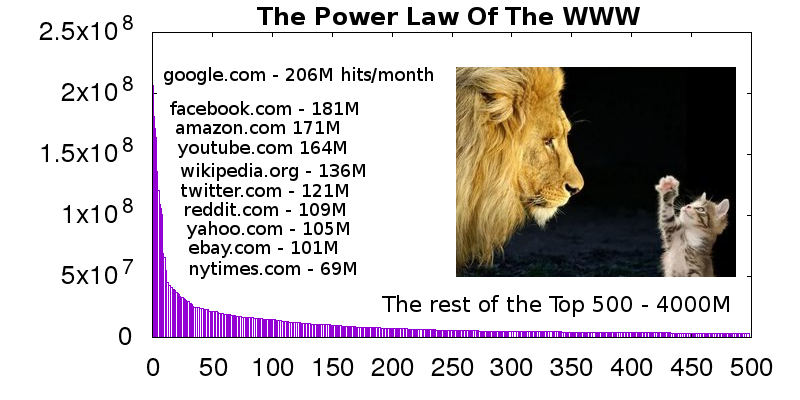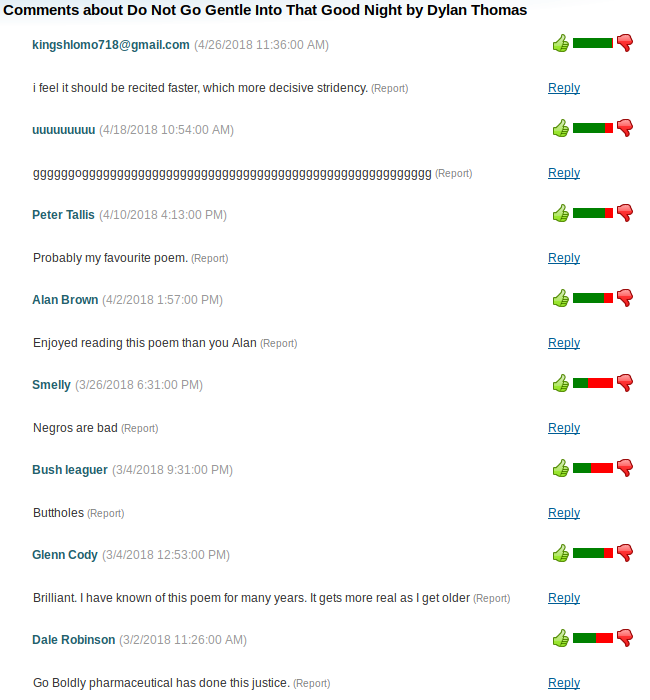TL;DR: If you want to comment on this post send me an email.
Most people probably don’t remember Prodigy. This was a pre world wide web dial-up modem networking service (Compuserve was another). It was a real prototype of the modern internet — it was jointly owned by IBM (tech), CBS (media), and Sears (shopping). Anyone remember Sears, the Amazon of the early 20th century? I remember being relieved in 1997 that independent web hosting had become a reasonably plausible and common thing allowing me to make my own proper web site and say good bye to predatory proprietary network portals for good.
Ha! But that’s not what happened is it? As I mentioned a few months ago, the modern web conforms to a Power Law.

To a great extent the internet has returned to the splendor of the 1990s with its mere handful of gatekeepers.
However, in that long tail, there are heroes out there who produce actual content. Early on some of us dreamers envisioned that if freed from venal pressures, independent voices on the internet could spread new ideas, perspectives, and empowering information (sort of like a distributed Wikipedia). Some of us still tilt at those windmills. The internet is what it is. Independent voices are pushed to the margins. When you do a Google search it’s hard to even conceptualize what you should expect to find these days. Independent websites today are like subversive pamphlets of the past.
Which brings me to today’s topic: comments. Imagine prolific 18th century pamphleteer, Benjamin Lay getting ready to "post" this.

If he had modern technology, this crusading rebel would have used something like blogger.com or joomla.com or medium.com or wordpress.com or something else edgy and "independent". What do you think would have happened in 1737 if Mr. Lay had put a note in his publication inviting anyone who had anything they wished to add to his views to submit them for inclusion in an addendum to be published at Lay’s expense? Well to get an idea, let’s take a look at some comments on a completely random web site ( for a poem) that I came across today.

Notice the 5th one. I’m guessing Mr. Lay would have seen something like that. And this comment system hilariously has mechanisms for upvoting and abuse reporting. See how well that works?
All sensible opinions I have about cryptocurrency come from reading the blog of the brilliant Elaine Ou (who rightly points out "Toiling in obscurity is underrated."). Here she is connecting her favorite topic of cryptocurrency to annoying intrusions into her blog by shady SEO vermin.
And there’s poor Robert X. Cringely who started his respected web site about the same time I started mine. In 2015 Bob did some Kickstarter thing with his kids for a small game server appliance and it was apparently not successful despite their best efforts. Now on his venerable blog the comments are basically unreadable because of trolls dissatisfied with that old project’s outcome. Here is a look at his most recent ten posts showing the portion of comments that explicitly mention "mineserver".
So that’s the problem. What can be done about it? Aggressively police and prune it? That’s what our generous overlords are sort of doing on our behalf since they know who posts the same annoying stuff too many times. But there is a better solution — do not host comments!
Reviewing the comments on my ancient posts once hosted by history’s biggest ad agency, I find they fall into two categories. Either they are me adding new information to the post or they are personal exchanges with people I know. In the former case, I now simply make labeled updates to my posts if necessary (e.g.). I can do that — I’m in complete control of exactly what is shown and when. What a concept!
Obviously people like to get positive feedback (which is pretty rare in on-line comments) and that brings up the solution to the second kind of comments: email. Yes, humble email. If someone has something to say to me, send me an email. You can pretty much make up any valid email address name (formally the local part) and send that to my domain which I assume, if you’re reading this, you’re familiar with. (That’s right, it’s xed.ch.)
Here’s where the magic happens. If your email is just an inside joke with me, cool, we will share it away from the hurtful stares of the wider cruel world. If you have something useful to add that I think may be of value to my readers (which mostly consist of my future selves), I will make one of the aforementioned updates. Will I credit you? It depends — sometimes people like to stay anonymous, certainly when faced with the prospect of being associated with me. I will use good judgement. If your email comment is so profoundly mind blowing that it should be brought to the widest possible audience, I will write a new blog post singling it out and praising its brilliance.
Now, you might be thinking, "But I’m popular and I get 51.4 (non-Mineserver) comments every time I post." Cool. That’s fine. If you’re not reading the comments, well, they’re probably a mess and they’re obviously not important to you. If you are reading them, you can read them as emails. And! You can more easily drop noise from disgruntled Mineserver backers.
But what if you profoundly disagree with me. Maybe you strongly believe comment #5. Don’t you have a right to free speech? Not on my blog you don’t! Fortunately there’s a very easy fix for this problem — get your own damn blog! There you can say what you like including how stupid I am for disparaging blog comments. (And pick through SEO bot droppings as you wish.) This is wonderfully self-regulating; if people like your opinions, they will read them. Also notice how I can email this post’s URL to Elaine and Bob for them to ignore or read as they see fit.
I think this is more important for popular bloggers. By adopting a no comment strategy you are encouraging a world wide web to exist. You are telling people, yes, you can be a first class node on this network too. Print your own pamphlets!
UPDATE 2019-05-28
My favorite website on the internet (besides the one created especially for me alluded to by this post’s theme — mine) is n-gate.com. The general theme of n-gate is to scathingly excoriate Silicon Valley culture by truthfully summarizing obtuse reader comments left on the frustrating Hackernews web forum — often written correctly with ironic quotes as "Hacker" "News". Today n-gate published a beautiful gem that I have to pass along.
A webshit [www user] is mad about medium dot com. Hackernews laments that there is no possible model for content distribution other than digital sharecropping, both because of the Hypothetical Idiot User and because everyone with the necessary training to implement an alternative (i.e. Hackernews) still believes ridiculous SEO urban legends circa the Bush administration. The idea that someone could just rent space in a colocation facility, install a web server, and start posting information onto the internet is, sadly, one hundred percent impossible, and can never happen.
This is ridiculing tech people who mostly make websites for a living for not being able to host their own content. Instead they fixate on sites like medium dot com (I also will abstain from linking to it). While there is no doubt a lively discussion among Silicon Valley nerds about the finer points of predatory blog host power dynamics, the pitiful truth is that, apparently, the large majority of Silicon Valley tech people can’t simply host their own damn web page. Tim Berners-Lee would be rolling in his grave if he were dead.